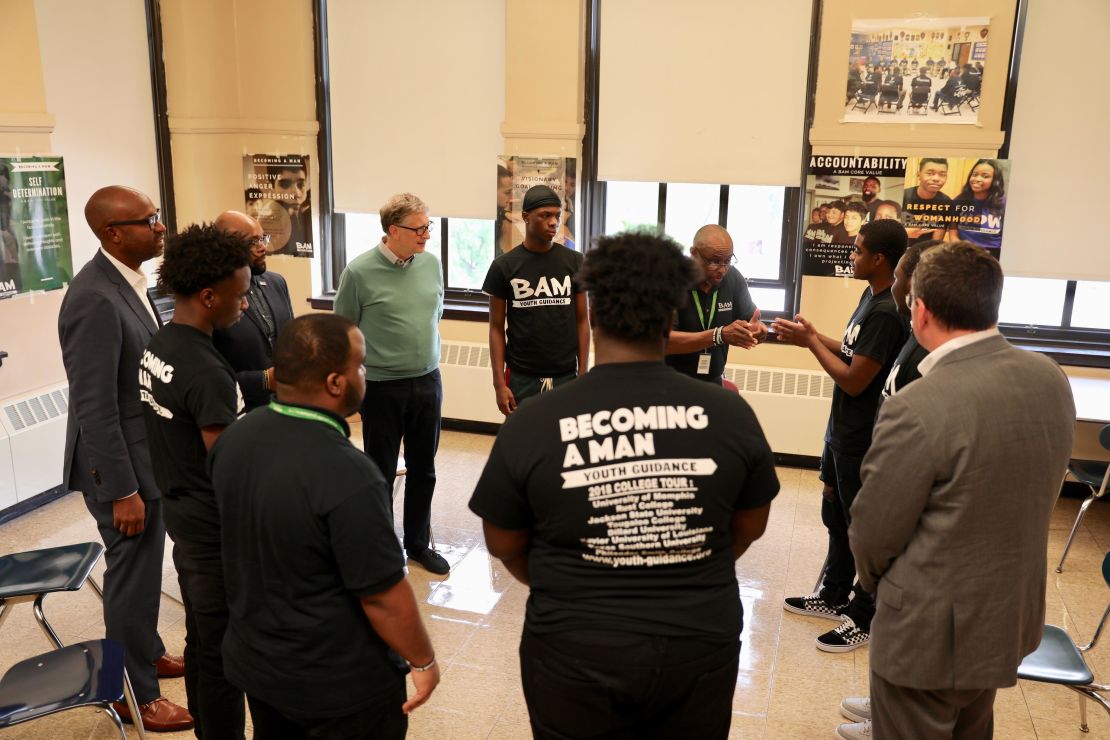Editor’s Note: The authors are co-chairs of the Bill & Melinda Gates Foundation. This article is adapted from their 2019 Annual Letter. The views expressed here are those of the authors. View more opinion on CNN.
As the parents of two teenagers (and one former teenager), we thought we’d seen everything an adolescent could throw our way. But when Bill sat down with a small group of high school students in Chicago last year, we were surprised to discover how much you can learn from teenage boys about processing your anger.

The discussion was organized by Youth Guidance’s Becoming a Man, a program that helps young men in neighborhoods with a lot of crime and gang activity explore their emotions and hone their decision-making skills. The conversation started with each person sharing the last time they got angry. Although some of the guys talked about typical teenage frustrations, others had tragic stories. One had just watched a family member go to jail. Another spoke about a friend who had been shot.
It was inspiring to see these young men facing such enormous challenges with thoughtfulness and resilience. Many people (ourselves included) don’t develop this emotional maturity until later in life, so these young men gave us a lot to think about.
In the nearly two decades since we started our foundation, we’ve found that surprises can be a powerful call to action. Sometimes a surprise helps you see that the status quo needs to change. Other times it underscores that transformation is happening, like what Bill experienced in Chicago.

In our annual letter this year, we wrote about that visit to Becoming a Man and eight other surprises that have helped shape the way we think about the world. We think they might surprise you, too:
- Africa is the youngest continent. While the rest of the world keeps getting older, the median age of Africa – and especially sub-Saharan Africa – stays young. This can be either an asset or a source of instability, depending on these young people’s access to high-quality health and education services.
- At-home DNA tests can help prevent premature birth. By looking at genetic samples voluntarily submitted by 23andMe users, scientists discovered a potential link between preterm labor and a gene that regulates how the body uses a mineral called selenium. Insights like this will help doctors extend more pregnancies to full term.
- The world will build an entire New York City every month for 40 years. The world’s building stock is expected to double by 2060, according to Architecture 2030. Manufacturing the cement and steel needed for all that construction will emit a lot of greenhouse gases. To solve climate change, we need to get to near-zero emissions on all the things that drive it, including making building materials.
- Data can be sexist. There are huge gaps in the global data about women and girls. For example, we don’t know how much income women in developing countries earned last year or how much property they own or how many more hours girls spend on household chores than boys do. Better data will help policymakers take action to improve women’s and girls’ lives.
- There’s a nationalist case for globalism. Nationalism is a loaded word. At its core, it’s the belief that a country’s first obligation is to itself. But even if a person believes countries should only act in their own self-interest, that doesn’t erase the need to engage with the broader world. Investing in the world’s poorest people makes all of us healthier and more secure.
- Toilets haven’t changed in a century. Flush toilets (which became prevalent in the 19th century) haven’t had an overhaul in a while. And while they’re still working just fine for rich countries, they aren’t an adequate solution for places that can’t afford or support sewer systems – which means more than 2 billion people don’t have access to a decent toilet, according to the World Health Organization. As a result, their waste often ends up in the environment untreated. A reinvented toilet that doesn’t require a sewer could save millions of lives.
- Textbooks are becoming obsolete. US classrooms are starting to replace traditional (heavy and expensive) textbooks with digital learning tools. These online tools are facilitating a new approach to student learning that is particularly beneficial to today’s college students, who are increasingly likely to be balancing school with earning an income and even raising a family.
- Mobile phones are most powerful in the hands of the world’s poorest women. For the world’s most marginalized women, a mobile phone does more than make their old life more convenient – it can help them build an entirely new life. Women are not only using their mobile phones to access services and opportunities; they’re using them to change social norms and challenge the power structures that perpetuate gender inequality.
Some of these surprises worry us. Others inspire us. All of them are prodding us to action. We hope they do the same for you, because that’s how we can make the world better.
This article has been updated with the full name of Youth Guidance’s Becoming a Man program.
